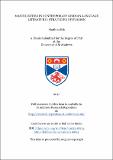Files in this item
Masculinities in contemporary German-language literature : strategies of evasion
Item metadata
| dc.contributor.advisor | Gratzke, Michael | |
| dc.contributor.advisor | Lawson, Colette | |
| dc.contributor.author | Eck, Matthias | |
| dc.coverage.spatial | ix, 265 p. | en_US |
| dc.date.accessioned | 2019-01-10T14:48:58Z | |
| dc.date.available | 2019-01-10T14:48:58Z | |
| dc.date.issued | 2017-06-22 | |
| dc.identifier.uri | https://hdl.handle.net/10023/16834 | |
| dc.description.abstract | In the quest for a positive alternative male gender identity (anti-hegemonic masculinity), this thesis explores the representation of masculinities in contemporary German-language literature (focusing on Austria) by examining selected works by Daniel Kehlmann, Doron Rabinovici and Arno Geiger. The research combines close reading with critical theory on gender. While theory is used to contextualize and critically evaluate findings from the texts, it is complemented and enhanced by insights stemming from close reading, thereby contributing to the development of theory on masculinities. While there is evidence of hegemonic subversion in the novels, the three authors offer few positive images of alternative masculinity. Kehlmann shows that hegemonic masculinity is a virtual concept which provides gratification through fantasy. It impacts on reality because men accept it as a standard for their own behaviour and social technologies constantly repeat this fantasy. Rabinovici illustrates how Jewish men unsuccessfully try to live up to the standard of hegemonic masculinity by switching identity. He shows how the male characters develop a fragile, weak masculinity as a result of their parents’ silence about their experiences during the Holocaust. He also provides examples of a positive masculinity which reflect the theory of a ‘gentle’ Jewish masculinity. Geiger examines disintegrating hegemonic masculinity, helpless complicit masculinity, strategic passive masculinity and caring masculinity. The latter category takes the concept of ‘gentle masculinity’ into a broader context. Again, memory of and communication about the Holocaust are shown to impact on masculinity. The texts analysed disclose a gap between the ideal of masculinity and reality. In order to bridge this gap the male characters adopt two strategies of evasion: evasion to hide a softer and gentler side, and evasion into a world of fantasy where they pretend to live up to the ideal of hegemonic masculinity. | en |
| dc.language.iso | en | en_US |
| dc.publisher | University of St Andrews | |
| dc.subject.lcc | PT3818.E3 | |
| dc.title | Masculinities in contemporary German-language literature : strategies of evasion | en_US |
| dc.type | Thesis | en_US |
| dc.type.qualificationlevel | Doctoral | en_US |
| dc.type.qualificationname | PhD Doctor of Philosophy | en_US |
| dc.publisher.institution | The University of St Andrews | en_US |
| dc.identifier.doi | https://doi.org/10.17630/10023-16834 |
This item appears in the following Collection(s)
Items in the St Andrews Research Repository are protected by copyright, with all rights reserved, unless otherwise indicated.

